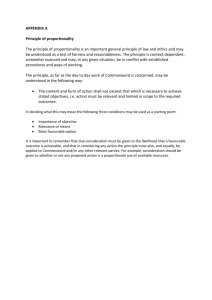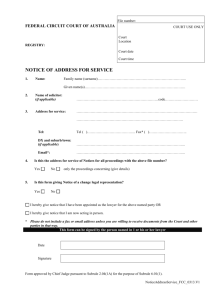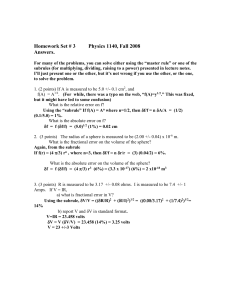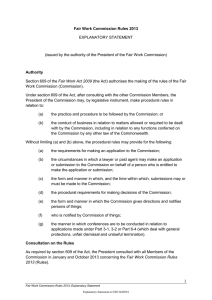Costs under the Family Law Rules (DOC)
advertisement
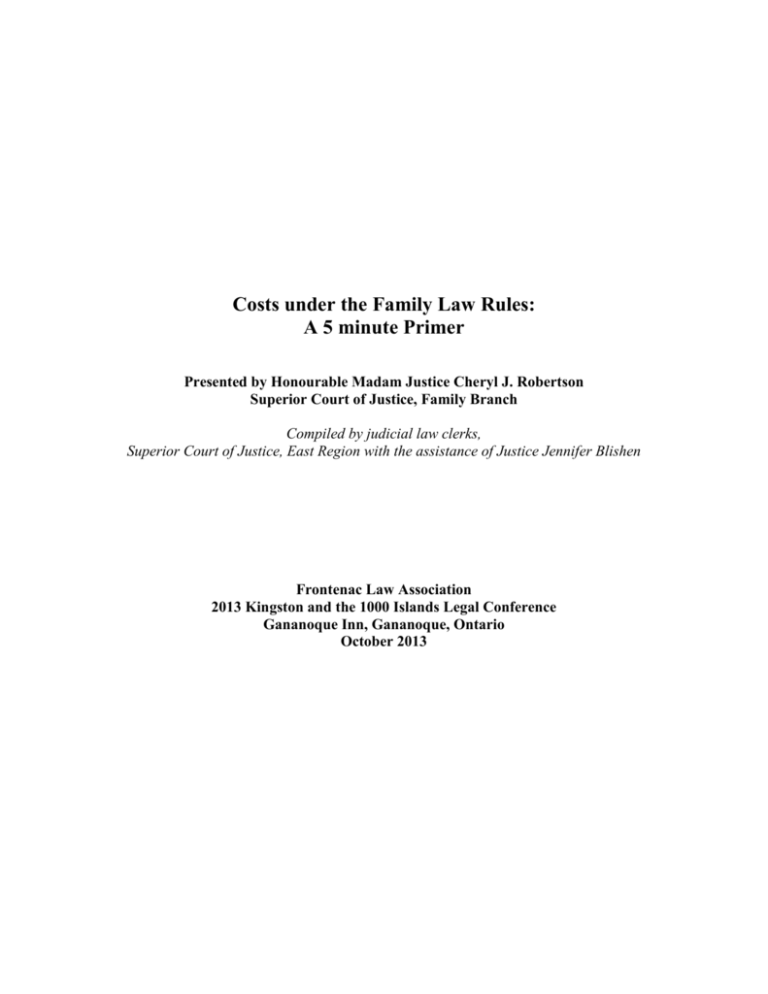
Costs under the Family Law Rules: A 5 minute Primer Presented by Honourable Madam Justice Cheryl J. Robertson Superior Court of Justice, Family Branch Compiled by judicial law clerks, Superior Court of Justice, East Region with the assistance of Justice Jennifer Blishen Frontenac Law Association 2013 Kingston and the 1000 Islands Legal Conference Gananoque Inn, Gananoque, Ontario October 2013 Under Rule 24 of the Family Law Rules, O. Reg. 114/99 (FLR), successful parties are presumed to be entitled to costs and, indeed, courts are awarding costs in increasingly larger amounts. At the same time, the court must “step back” to determine if a cost Order is fair and reasonable while accounting for the distinctive family law regime which combines elements of statute and caselaw. In arguing for costs, counsel should consider not only the procedural elements of when and how to ask for costs but also how to persuasively frame their costs arguments. This paper provides an: (1) Overview of the rules concerning costs awards in family law; (2) Determining eligibility and quantum; and (3) The top ten tips for arguing costs in a family law proceeding. A list of additional materials is also attached. (1) Overview of the rules concerning costs awarded in family law The purpose of costs awards Costs awards should reflect what the court views as a fair and reasonable amount that should be paid by the unsuccessful party as held in Serra v. Serra, 2009 ONCA 395, 66 R.F.L. (6th) 40. Modern cost rules foster three main principles: 1) To partially indemnify litigants for the cost of litigation; 2) To encourage settlement; and 3) To discourage and sanction inappropriate behavior by litigants. Key Principles – reasonableness and proportionality Reasonableness Rule 24(11)(b) requires the court to consider whether parties acted reasonably. The size of the costs award should reflect what the court considers to be a fair and reasonable amount to be paid by the successful party rather than an exact measure of the actual costs of a successful litigant as described in Zesta Engineering Ltd. v. Cloutier (2002), 21 C.C.E.L. (3d) 161 (Ont. C.A.). As reasonableness is a subjective factor, a useful view of case law and principles of reasonable conduct is provided in Pollitt v. Pollitt, 2011 CarswellOnt 5873. Some of the main considerations include the expectations provided to the parties by counsel regarding the size of a cost award, non-disclosure and taking positions lacking credibility, bombardment of unnecessary requests, wasting valuable court time, failing to disclose relevant documents and failure to make an offer. 2 Proportionality Factors in rule 24(11)(a), (c) and (d) underline the importance of proportionality. In general, costs orders do not allow counsel to recover for spending inordinate amounts of time. As a rule of thumb, evaluate proportionality in noting what the losing party should have anticipated concerning responsibilities for costs. Key Statutory References Rule 24 is the main statutory reference for costs in the FLR. Congruent with Serra, there is a stated presumption that a successful party is entitled to the costs of a motion, enforcement, case/appeal with a few exceptions. However, costs may not be allowed if parties behave unreasonably, as noted in subrules 24(4) and (5). A failure of the trial judge to award costs to a successful party, unless there is evidence that a party acted unreasonably, is an error at law given the created presumption in RFL, subrule 24(1) as held in Wylie v. Leclair (2003), 64 O.R. (3d) 782 (C.A.). However, while rule 24 has circumscribed the broad discretion on costs as described in s. 131(1) of the Courts of Justice Act, R.S.O. 1990, c. C.43, it has not entirely removed discretion on the part of the trial judge. While a rebuttable presumption exists, the court may exercise its discretion based on the following key factors, as described in M. (A.C.) v. M.D., 67 O.R. (3d) 181 (C.A.): - The financial means of the successful party; The reasonableness of the successful party’s bill of costs; and The behaviour of the successful party. At the same time, while rule 24 is only to be circumvented in an unusual circumstance, there is considerable discretion available to the trial judge as held in Feng v. Philips, [2006] O.J. No. 1708 (Sup. Ct.). There is however no requirement in rules 18(14) nor 24(1) that a court make a costs award as held in Murray v. Murray (2005), 79 O.R. (3d) 147 and recently reaffirmed in Ruffudeen-Coutts v. Coutts, 2012 ONCA 263, 15 R.F.L. (7th) 35. Finally, note that there is also a very limited scope for appeal as held in Stewart v. Crane, 2011 ONCA 758, [2011] O.J. No. 5332, as reflected in the relevant test in Children’s Aid Society of the Niagara Region v. D. (R.) (2005), 15 R.F.L. (6th) 117. (2) Determining eligibility to and quantum of costs Family law decisions are often complicated by overlapping and intersecting issues, many of which are non financial in nature. There is also variability in results for both parties. Unique issues must be considered in assessing both entitlement to and quantum of costs. In this context, reasonableness reigns supreme: unreasonable behavior is not limited to offers to settle and include conduct predating the commencement of a motion: Lawson v. Lawson, [2004] O.J. No. 3206 (Sup. Ct.). A successful party who has behaved unreasonably may be disentitled 3 to some or all of that party’s costs, but nothing in the rules makes unreasonable conduct of the unsuccessful party a condition precedent for a costs award on a full recovery basis: SimsHowarth v. Bilcliffe (2000), 6 R.F.L. (5th) 430 (Sup. Ct.). At the same time, unreasonable conduct on the part of the unsuccessful party is to be considered. Entitlement to costs Entitlement is generally only argued in exceptional circumstances including disclosure issues, if there was an offer made that was more favourable to your client or egregious behavior. While there are admittedly multiple judicial interpretations of the best roadmap, the court in Van Rassel v. Van Rassel, 61 R.F.L. (6th) 364 (Ont. Sup. Ct.) provides a useful overview of the relevant factors in determining entitlement to costs. They include: (1) (2) (3) (4) (5) The result and who was successful; Offers to settle; Conduct of the parties; Reasonableness of costs claimed; and Financial means of unsuccessful party including the issue of the impact on the child to the paying party of a larger costs’ order. A cost award is discretionary in terms of both the quantum to be paid and by whom. A useful review of the main categories of quantum of costs is laid out in David M. Steinberg et al., Ontario Family Law Practice 2013 (Markham: LexisNexis, 2013), at 1464-1469. These categories include: (a) Successful Party Entitled to Costs; (b) Above Average to Full Recovery Granted; (c) Above Average to Full Recovery Not Applicable; (d) No costs awarded; (e) Unsuccessful party entitled to costs; and (f) Entitlement to a premium. Quantum of costs In addition to the summary of reasonableness and proportionality described above, subrule 24(11) states the following factors are to be considered in quantifying costs: (a) (b) (c) (d) the importance, complexity or difficulty of the issues; the reasonableness or unreasonableness of each party’s behavior in the case; the lawyer’s rates; the time properly spent on the case, including conversations between the lawyer and the party or witnesses, drafting documents and correspondence, attempts to settle, preparation, hearing, argument, and preparation and signature of the order; (e) expenses properly paid or payable; and (f) any other relevant matter. Note the inability to pay is not listed though it can be brought under “any other relevant matter.” However, this can be used as a defence to costs liability in cases that involve access and custody issues where the financial impacts inflicted upon a parent would be considerable. 4 (3) Top Ten Tips for Arguing Costs in a Family Law Proceeding1 1) Attempt to persuade the judge of the perspective of your client at each stage Counsel should know how best to frame their costs arguments. Paranavitana v. Nanayakkara, 2010 ONSC 2257, 83 R.F.L. (6th) 184 (Sup. Ct.) at para. 8, provides an eight step process which incorporates aspects of relevant legislation, the unique factual matrix of the case in addition to the judicial history behind each subrule which assists in informing counsel about their intent. At the same time, Justice Wildman notes the competing authorities in this area. 2) Prepare draft bills of costs for all appearances Without a specific order for costs at the numerous steps take in a case prior to trial, costs related to those steps should not be included as part of the costs awarded for the trial as held in Islam v. Rahman, 2007 ONCA 722, 41 R.F.L. (6th) 10. Supporting documents such as dockets, billing statements and invoices for major disbursements, should be provided. If you are unable to provide a bill of costs, politely ask for leave to re-attend with a bill of costs or to provide written submissions. 3) Costs can be ordered against a lawyer personally Rule 24(9) states that if a lawyer wastes or runs up costs without reasonable cause, the court may, on motion or on its own initiative, order costs against the lawyer. Be wary of condoning a client to use self-help measures concerning de facto custody of a child, filing court materials that are spurious or maintaining a position long after it is obvious that it is untenable. Sharp practice, such as failing to inform opposing counsel or a judge with concurrent jurisdiction, will receive a similar rebuke as held in Sambasivam v. Pulendrarajah, 2012 ONCJ 711. 4) Beware being bedeviled by “bad faith” Costs can be ordered, on a full recovery basis and payable forthwith, under R. 24(8) irrespective of other costs presumptions. 5) Is there a specific subrule that addresses the particular step in the proceeding? Certain FLR rules deal with specific costs issues. Consider the following: R. 12(3-4) R. 13(16) R. 14(23)(c) R. 16(10-11) R. 17(18) Costs concerning withdrawals Costs for failure to deliver financial documents Costs for failure to obey a temporary order Costs under an unsuccessful motion for summary judgment and for acting in bad faith during the motion proceedings Costs of adjourned conference 1 Some of the items are found in Henry Vogelsang et al., McLeod’s Ontario Family Law Rules Annotated 2011 (Toronto: Thomson Reuters, 2011) at 311-12. 5 R. 18(14-16) Cost consequences of failure to accept settlement offer (largely akin to R. 49.10 and R. 39.13 of the RCP) R. 19(10)5 Failure to disclose documents 6) Disclosure Delay Recent caselaw reaffirms the likely sanction of cost awards for delayed disclosure of expert’s reports which prevented settlement and trial readiness as held in Blaney v. Blaney, 2012 ONSC 1777. 7) Ignore offers to settle at your peril Consider subrule 18(14) and the presumption of near automatic cost consequences. Also, courts consider the timing of settlement offers, in an attempt to promote earlier offers. Defending parties use an offer to settle to shield their clients from costs – those offers made at the eleventh hour which fail to account for costs are fraught with risk. Onus issues, at subrule 18(15), should also be considered. 8) Divided success can result in set off costs While recognizing the rebuttable presumption concerning costs, if there is divided success, the court may set off costs as between the parties under R. 24(1) and (6). 9) Consider disaggregating costs attributable to a support issue They may be enforceable by the Family Responsibility Office (FRO) and will thus survive bankruptcy of the payor. 10) Don’t reargue the case during costs submissions Submissions on costs are not an opportunity to re-argue the case. Question entitlement only if necessary (see above). Like any other submissions, point first arguments should be used: state what you would like, provide an overview of the facts and then apply it to the relevant law. 6 Additional Resources: Aaron M. Franks, “Preparing for the Motion; Arguing the Motion; Winning the Motion; and Getting Costs for the Motion – or – Justice … (with Costs!)” (Paper presented to the Law Society of Upper Canada’s Case Conferences and Motions in Family Law, 20 January 2011). Barb Thompson, “Costs for Family Lawyers” (Paper presented to the Carleton Country Law Association’s 15th Annual Institute of Family Law 2006, 2 June 2006). Bryan R.G. Smith & Bastedo S. Smith, “Best Costs Arguments” (Paper presented to the Ontario Bar Association’s Conference on Remedies for Unfair Tactics in Family Law Cases, 31 March 2008). Bryan Smith, R. Goodman & Bastedo Smith, “Costs: Stepping Back…” (Paper presented to the Law Society of Upper Canada’s 6th Annual Family Law Summit, 10 and 11 May 2012). David M. Steinberg et al., Ontario Family Law Practice 2013 (Markham: LexisNexis, 2013). Henry Vogelsang et al., McLeod’s Ontario Family Law Rules Annotated 2011 (Toronto: Thomson Reuters, 2011). Justice Julianne Parfett, “The Price is Right: Commentary on Costs” (Paper presented to the Carleton County Law Association’s 18th Annual Institute of Family Law 2009, 17 April 2009). Mimi Marrello, “Costs Award at the Ottawa Bench” (Paper presented to the Carleton Country Law Association’s 15th Annual Institute of Family Law 2006, 2 June 2006). Mark Orkin & Marie Gordon, “Costs in Family Law-Selected Issues”, (2003) 20 C.F.L.Q. 363. Tammy MacKenzie, “How to handle costs in family law” The Lawyers Weekly (13 November 2009), online: LexisNexis http://canadian-lawyers.ca/Understand-Your-Legal-Issue/FamilyLaw/How-to-handle-costs-in-family-law.html. 7
